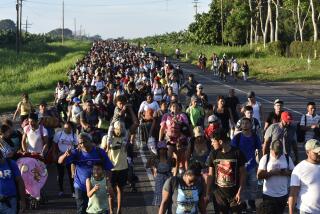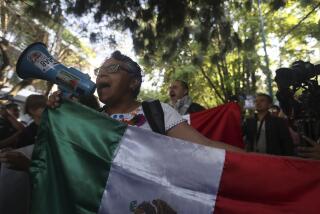Colombia says FARC struck from Ecuador
CUENCA, ECUADOR â Colombia said Saturday that leftist FARC guerrillas had fired five makeshift mortar rounds at army units from inside Ecuador, and it said it would file a formal note of protest demanding better border security.
One Colombian soldier was injured in the attack Friday near the border town of Teteye. The mortar rounds were converted propane gas cylinders filled with explosives, a common weapon of the Revolutionary Armed Forces of Colombia, or FARC, according to a Colombian Defense Ministry spokesman. A similar attack near Teteye in 2005 killed 25 soldiers, Colombia has said.
Colombiaâs army commander, Gen. Mario Montoya, cited press reports quoting demobilized rebels who said that the FARC maintained 60 to 80 camps on the Ecuadorean side of the border.
Ecuador said it was waiting to receive the protest note to formally respond. But Undersecretary of Defense Miguel Carvajal said in a telephone interview Saturday night that the claim was part of a âdefamation campaignâ to divert attention from Colombiaâs internal problems.
âItâs an absurdity to say the FARC needs to use our territory, when every day at all hours the rebels are attacking Colombian armed forces within Colombia,â Carvajal said. âThis is a smoke screen by Colombia to evade dealing with its internal problems.â
Ecuadorean forces âare fully deployed in the border area in 25 military bases. Colombia has four,â Carvajal said. âThere are no illegal armed groups operating inside Ecuador.â
The alleged attack is the first major border incident since Colombian troops and aircraft crossed the boundary and killed the FARCâs No. 2 commander, known by his alias Raul Reyes. Colombia later said it mounted the March 1 operation, which also killed at least 22 others, because it didnât trust Ecuador to expel or capture Reyes.
Colombia said files found in three laptop computers recovered at the Reyes camp showed that he had met with Ecuadorean Interior Minister Gustavo Larrea. Larrea acknowledged meeting with Reyes but said he had done so for humanitarian reasons, to secure the release of FARC hostages.
Ecuador and Venezuela each sent thousands of troops to their borders with Colombia after the March raid. Diplomatic relations among the three countries were suspended.
The Organization of American States denounced Colombia for violating Ecuadorâs sovereignty but upheld Colombiaâs right to defend its national security.
Tensions remain high between Colombia and Ecuador. Diplomatic relations have not been restored. Colombian President Alvaro Uribe and Ecuadorean President Rafael Correa regularly denounce each other.
--
More to Read
Sign up for Essential California
The most important California stories and recommendations in your inbox every morning.
You may occasionally receive promotional content from the Los Angeles Times.










